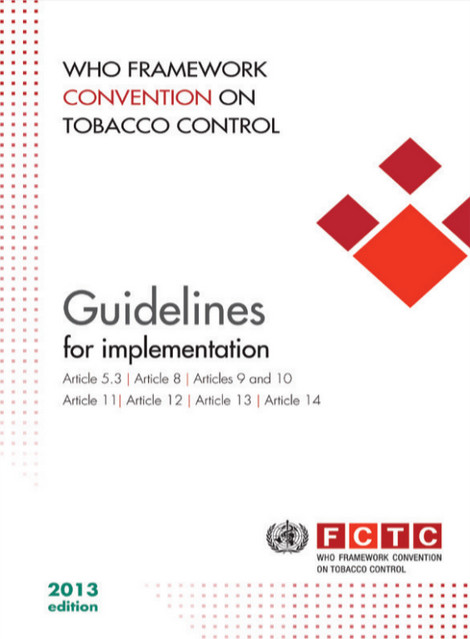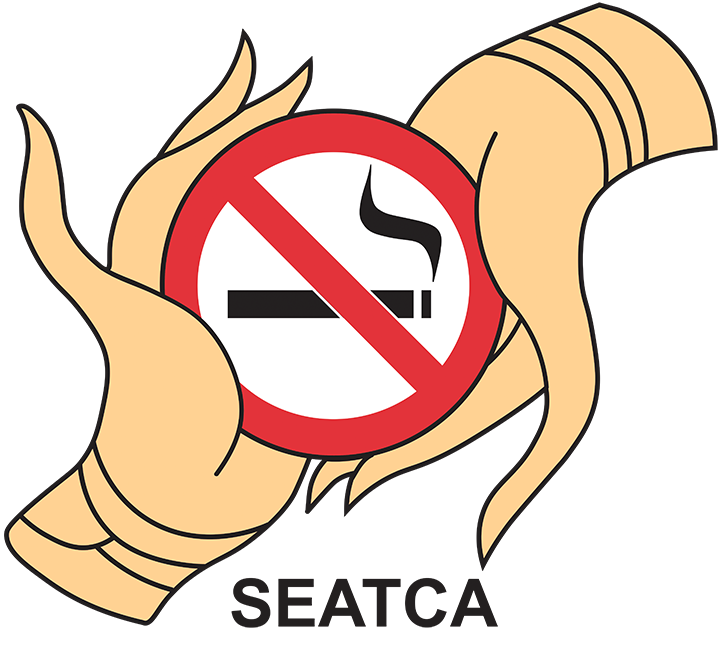
FCTC compliance in ASEAN
WHO FCTC Ratification
are Parties to the WHO FCTC. Indonesia is a non-Party to the WHO FCTC
WHO FCTC Articles 5.1: Tobacco control strategies and plans and 5.2: Coordinating mechanism or focal point for tobacco control
have established or reinforced and financed a national coordinating mechanism for tobacco control, as well as developed multi-sectoral national tobacco control strategies, plans, and programmes in accordance with the WHO FCTC
WHO FCTC Article 5.3: Protection from tobacco industry (TI) interference
have a code of conduct or guidelines on protection of tobacco control policies from tobacco industry interference
WHO FCTC Article 6: Price and tax measures
have regular adjustment processes or procedures for periodic revaluation of tobacco tax levels
WHO FCTC Article 8: Protection from exposure to tobacco smoke
require smoke-free public places
WHO FCTC Article 11: Packaging and labelling
require pictorial health warning labels on tobacco packaging
require standardized/plain tobacco packaging
WHO FCTC Article 13: Comprehensive bans on tobacco advertising, promotion, and sponsorship
have implemented a fairly comprehensive ban on advertising, promotion and sponsorship
WHO FCTC Article 26: Financial resources
have established a health promotion or tobacco control fund from tobacco taxes
WHO FCTC: A Must for Sustainable Development

Designed to counter the global tobacco epidemic, the World Health
Organization (WHO) Framework Convention on Tobacco Control (FCTC)
is the first public health treaty negotiated under the auspices of
the WHO. The World Health Assembly (WHA) adopted the WHO FCTC in
2003; it is a landmark legal instrument in international,
regional, and national tobacco control that has changed the
paradigm of public health. At present, 183 governments,
representing more than 90% of the world’s population, are Parties
to the WHO FCTC and have committed to implementing the treaty’s
various lifesaving measures. Indonesia is the only ASEAN country
that has not ratified the WHO FCTC.
The WHO FCTC provides a policy framework to reduce tobacco
consumption through evidence-based supply and demand regulatory
interventions, such as: (a) protecting public health policies from
commercial and vested interests of the tobacco industry; (b)
raising tobacco excise taxes and using the revenue to fund tobacco
control; (c) legislating for smoke-free environments banning
smoking in public places; (d) implementing pictorial health
warnings and standardized/plain packaging on tobacco products; (e)
banning tobacco advertising, promotion, and sponsorship; (f)
eliminating illicit trade in tobacco products; (g) providing
alternative livelihoods to tobacco farming; (h) preventing sales
to and by minors; and (i) collecting and sharing data on tobacco
use and prevention efforts.
Because tobacco poses a major threat to life and health (killing
more than 8 million people annually, including 1.3 million
non-smokers exposed to second-hand smoke), it also threatens
sustainable global and national development. A multisectoral,
whole-of-government, and whole-of-society approach is therefore
essential for the implementation of the WHO FCTC as a means to
achieving the Sustainable Development Goals (SDGs) and to meet the
global target of a 30% relative reduction in tobacco use
prevalence among persons aged 15 and over by 2030 as agreed by WHO
Member States.
Within ASEAN, most countries have made significant progress in
implementing measures to reduce tobacco use in line with the WHO
FCTC since its entry into force in 2005.
Over the past several years, ASEAN member states have demonstrated
growing commitment and leadership in adopting FCTC-compliant
policies and interventions, particularly to (a) protect the public
from exposure to secondhand smoke by restricting smoking and
ensuring 100% smoke-free environments in all enclosed workplaces,
public places, and public transportation, covering all forms of
tobacco products including waterpipes and electronic smoking
devices (e-cigarettes and heated tobacco products) (Article 8) and
(b) raise public awareness of health risks of tobacco use, help
motivate quit attempts, and discourage tobacco use uptake through
standardized (plain) tobacco product packaging and prominent
pictorial health warnings on all tobacco packages (Article 11).
That said, full implementation of the WHO FCTC remains a work in
progress, and further strengthening of national tobacco control
policy is needed to achieve the objective of the treaty. This
includes reducing tobacco product affordability through tobacco
tax systems strengthening and regular excise tax increases
(Article 6); enforcing a comprehensive ban on tobacco advertising,
promotion and sponsorship, including prohibiting corporate social
responsibility (CSR) activities by the tobacco industry, banning
retail pack display and online sales of tobacco products and all
electronic smoking devices (Article 13); and securing sustainable
financing for tobacco control (Article 26), such as through
establishment of health promotion/tobacco control mechanisms
funded through tobacco surcharge taxes. It is also widely
acknowledged that most ASEAN member states still lag in
safeguarding their public health policies from tobacco industry
interference (Article 5.3), which is a major obstacle to effective
tobacco control implementation.
Support Tobacco Control in ASEAN
Your donation helps strengthen tobacco control efforts across Southeast Asia,
funding critical programs that save
